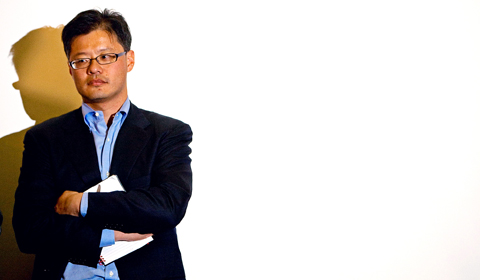A person familiar with Microsoft Corp’s bid for Yahoo Inc said on Friday the software company is re-evaluating its offer in light of the economic climate and the Internet pioneer’s deteriorating business.
The person, who asked not to be named because he was not authorized to speak publicly, said Yahoo’s share of the search market and overall conditions have deteriorated since Microsoft announced its bid on Feb. 1.
At the time, Microsoft offered US$44.6 billion, or 62 percent above Yahoo’s market value. The deal is currently valued at about US$41 billion, based on Friday’s closing share prices.

PHOTO: AFP
Yahoo’s board formally rejected Microsoft’s bid, saying it undervalues the company. The person familiar with Microsoft’s thinking said the company has been patient — but will be so only to a point.
“It’s up to Yahoo’s board to engage in meaningful negotiations with Microsoft,” the person said.
Senior executives of the two companies reportedly met last week near Yahoo’s Sunnyvale, California, headquarters but walked away without advancing the negotiations, the Wall Street Journal said.
Spokespeople for Microsoft and Yahoo declined to comment when asked about the meeting.
Separately, a jury ordered Microsoft on Friday to pay US$367.4 million to Alcatel-Lucent for infringing on two patents, a decision the software maker vowed to appeal.
The US District Court jury in San Diego, California, found that handwriting recognition technology in Microsoft’s Tablet PC operating system infringed on pattern recognition patents held by Paris-based Alcatel-Lucent.
The jury also decided that some of Microsoft’s programs, including the Outlook e-mail application and the Windows Mobile operating system, infringed on an Alcatel-Lucent patent in the way users select calendar dates from a menu.

Quanta Computer Inc (廣達) chairman Barry Lam (林百里) is expected to share his views about the artificial intelligence (AI) industry’s prospects during his speech at the company’s 37th anniversary ceremony, as AI servers have become a new growth engine for the equipment manufacturing service provider. Lam’s speech is much anticipated, as Quanta has risen as one of the world’s major AI server suppliers. The company reported a 30 percent year-on-year growth in consolidated revenue to NT$1.41 trillion (US$43.35 billion) last year, thanks to fast-growing demand for servers, especially those with AI capabilities. The company told investors in November last year that

Intel Corp has named Tasha Chuang (莊蓓瑜) to lead Intel Taiwan in a bid to reinforce relations between the company and its Taiwanese partners. The appointment of Chuang as general manager for Intel Taiwan takes effect on Thursday, the firm said in a statement yesterday. Chuang is to lead her team in Taiwan to pursue product development and sales growth in an effort to reinforce the company’s ties with its partners and clients, Intel said. Chuang was previously in charge of managing Intel’s ties with leading Taiwanese PC brand Asustek Computer Inc (華碩), which included helping Asustek strengthen its global businesses, the company

Taiwanese suppliers to Taiwan Semiconductor Manufacturing Co. (TSMC, 台積電) are expected to follow the contract chipmaker’s step to invest in the US, but their relocation may be seven to eight years away, Minister of Economic Affairs J.W. Kuo (郭智輝) said yesterday. When asked by opposition Chinese Nationalist Party (KMT) Legislator Niu Hsu-ting (牛煦庭) in the legislature about growing concerns that TSMC’s huge investments in the US will prompt its suppliers to follow suit, Kuo said based on the chipmaker’s current limited production volume, it is unlikely to lead its supply chain to go there for now. “Unless TSMC completes its planned six

TikTok abounds with viral videos accusing prestigious brands of secretly manufacturing luxury goods in China so they can be sold at cut prices. However, while these “revelations” are spurious, behind them lurks a well-oiled machine for selling counterfeit goods that is making the most of the confusion surrounding trade tariffs. Chinese content creators who portray themselves as workers or subcontractors in the luxury goods business claim that Beijing has lifted confidentiality clauses on local subcontractors as a way to respond to the huge hike in customs duties imposed on China by US President Donald Trump. They say this Chinese decision, of which Agence